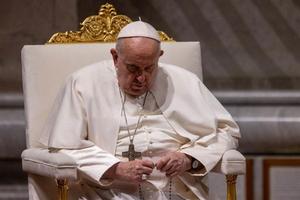The Traditional Irish Wake Highlights Importance of Praying for Departed Souls
For all the clichés, the Catholic triduum of death, resting and resurrection is, at the heart, a traditional ritual of mourning, community and remembrance of a life well lived, traditionally in the family home but adapted for current times and locales.

“I’m sorry for your troubles.” — traditional Irish greeting to the bereaved
The Irish wake has been the subject of poems, songs, films and stage plays. For all the clichés, the Catholic triduum of death, resting and resurrection is, at the heart, a traditional ritual of mourning, community and remembrance of a life well lived, traditionally in the family home but adapted for current times and locales.
A wake is not a uniquely Irish custom, but in parts of Ireland, it still provides an opportunity for parish, community and friends, far and wide, to pay respects.
“The wake is an essential part of the life of a parish because theologically, sacramentally, sociologically and psychologically, it works — because the whole thing is about story, and everybody has a story,” Father Francis Bradley, a parish priest in Buncrana, County Donegal, told the Register.
And the tradition extends to the Irish diaspora.
In Boston, Father William Kennedy, pastor of St. Monica and St. Peter Lithuanian parishes, who has not seen any instances of a wake in a family home, underscores the importance of praying for the beloved dead.
“I have seen wakes in the church in the morning or evening before the Mass,” he told the Register. “We would use the prayers for the vigils found in the Rite of Christian Burial.”
His parish is clear in its guidance that the liturgy of Christian burial signifies the faith community’s pivotal beliefs in life, death and eternal life and that sadness and joy must be seen together.
Back in Monaghan, Ireland, Father Owen Gorman serves several rural parishes where the three-day traditional wake, pointing to the triduum of death, resting and resurrection, is a mainstay.
“If you die Wednesday, the funeral will be on a Friday,” he said. “For Irish people, when you die, you go home, stay home for the wake, and then you’re brought to the church.”
Father Gorman explained the practicalities of a wake in Ireland. Typically, signs indicating that a wake is planned are placed along the roadside.
“Upon arrival,” he continued, “mourners will be met at the door by a greeter and shown to the room where the deceased person is in repose. Furniture removed, mirrors removed or covered, clocks stopped at the time of death, a crucifix and holy water on a side table. Normally, one or two of the deceased’s closest family will sit in the room with the coffin, with mourners, drinking tea and exchanging conversation. People will stay up with the deceased during the night, telling stories.”
This tradition began for a practical purpose, according to Heather Conway, professor of law and death studies at Queens University, Belfast. The original purpose of a wake was to ensure that the person was actually deceased. “As they evolved,” she explained, “wakes became important social rituals. It is a way to remember the deceased and to share memories of the person, to offer condolences to the deceased’s family in a less formal setting than the funeral itself. They reinforce the sense of community ties and support for the bereaved family, especially in more rural settings.”
“A wake gives people time to come to terms with their loss,” added Willie John O’Donnell, a funeral director in County Antrim, Ireland. “If there wasn’t a wake, a death can take longer to process on your own with much less distractions.”
He pointed to changes in wake customs.
“Today, people are more likely to request family time from, say, 10 p.m. to 10 a.m., which is another way of saying we aren’t sitting up all night. Notices such as ‘House Private’ ‘House Strictly Private’ ‘House Strictly Private, No Exceptions’ are commonplace nowadays. A funeral home would be more commonly requested if someone died in a town or city.”
At a wake, the saying of the Rosary has a purpose as a balm and a prayer. As the cadence of the Rosary prayers rises and falls, mourners have the time and space to be alone in prayer while still in the company of the deceased.
Today, in a more secular Emerald Isle, fewer people are familiar with praying the Rosary, as Father Bradley explained. “It’s not as familiar to children in their homes or to people as it would have been years ago. Nevertheless, it’s still there; and as a priest, you could be forgiven for many things in the parish, but not if you didn’t turn up to the wake to say the Rosary.”
Father Bradley underlined the necessity of praying for the dead.
“Our liturgy says that we believe that all the ties of friendship and affection won throughout our lives do not unravel with death,” said the priest. “Death might remove us from somebody’s sight, but we remember them.”
Back near Boston, Richard Gormley is a funeral director in his family-owned Gormley Funeral Home in West Roxbury, Massachusetts.
“I do the most Irish funeral trade in the city,” Gromley told the Register.
Gormley has rarely had a family request a wake for their deceased family member in their own home, observing, “It’s more convenient at my house. As the relatives and friends come in, they say prayers, greet the family, and give them a Mass card. The wake is just like a one- or two-hour get-together.”
For an Irish funeral, Gormley organizes a piper to walk with the cortege and play when the deceased is brought to and from the church and at the graveside. This is considered part of the Irish funeral tradition in the United States, but it is seldom, if ever, a feature in Ireland.
In Boston, as in Ireland, the funeral Mass will be followed by a get-together in a hall or restaurant where mourners join together in a meal and memories. Stories will be told, and tales exchanged, full of both joy and sorrow, as Conway put it, as “a way to remember the deceased and to share memories of the person.”
- Keywords:
- mourning
- wakes and funerals
- faithful departed
- month of the holy souls
- praying for the dead
- all souls day
















